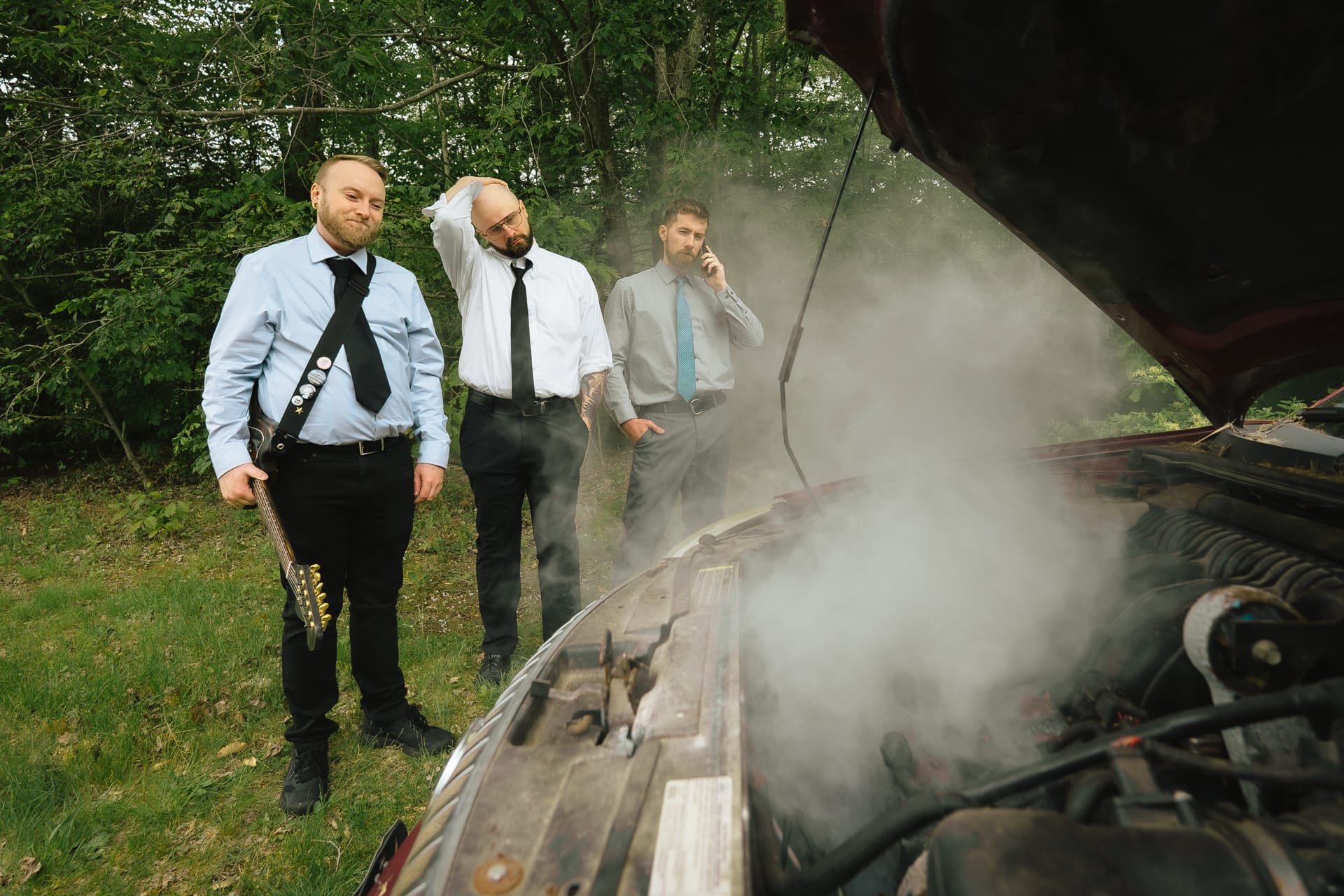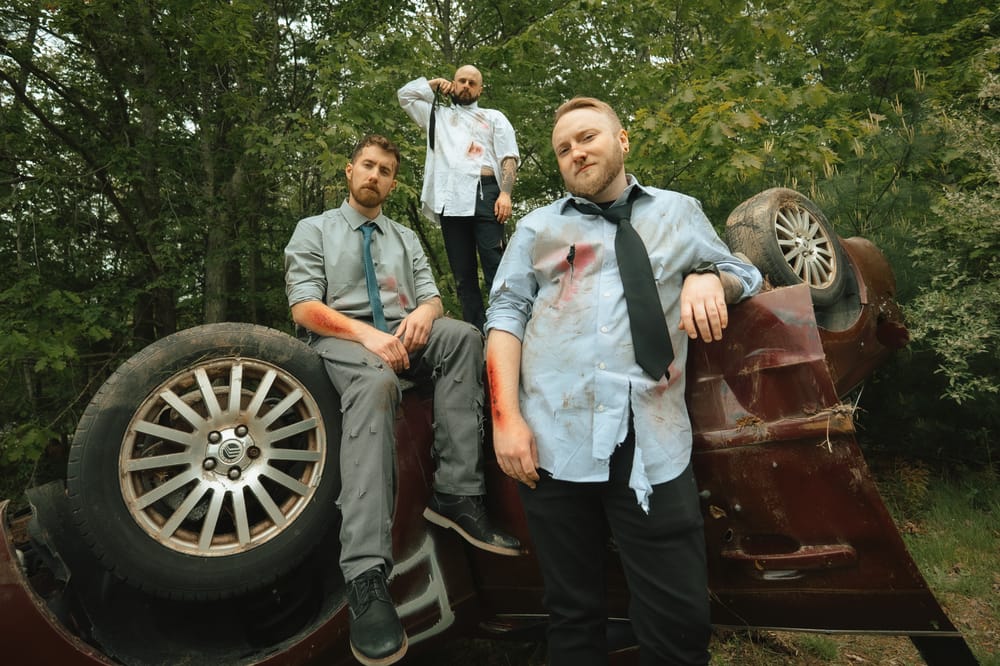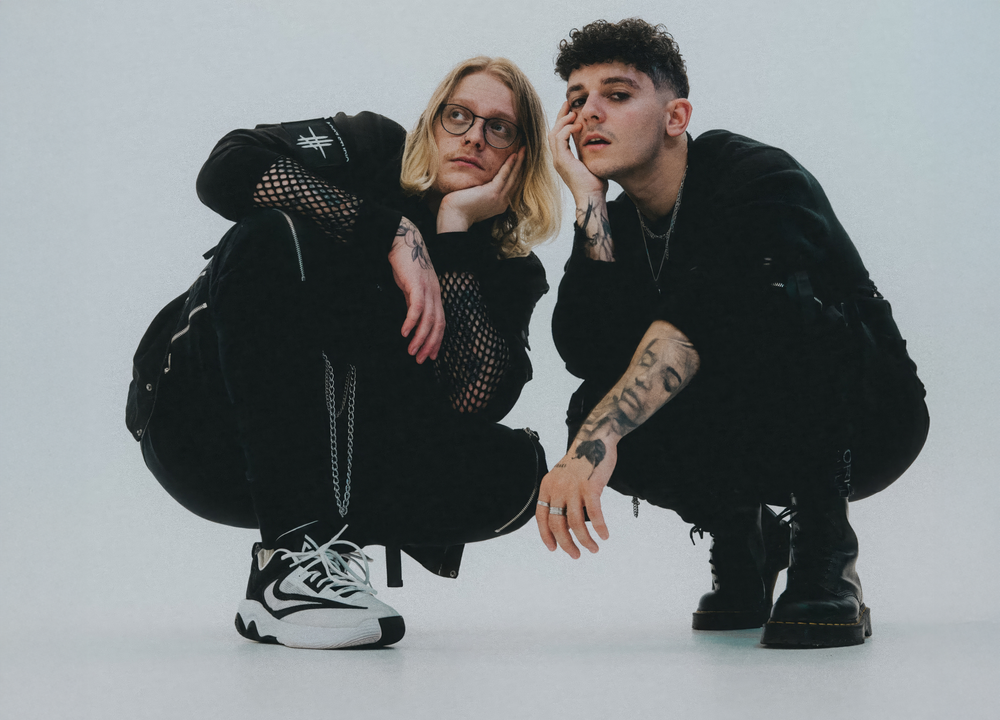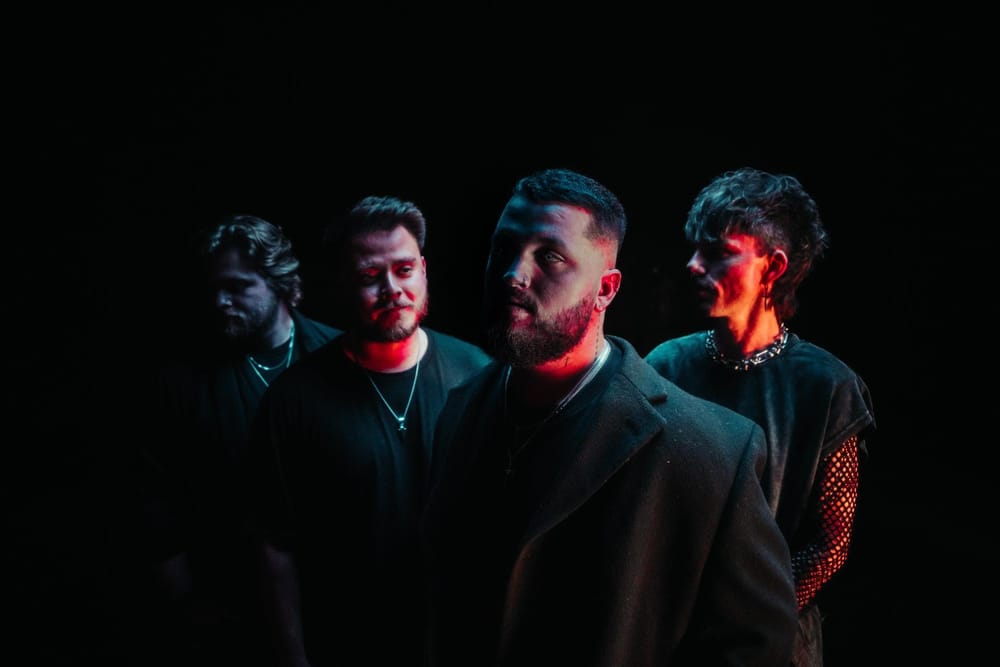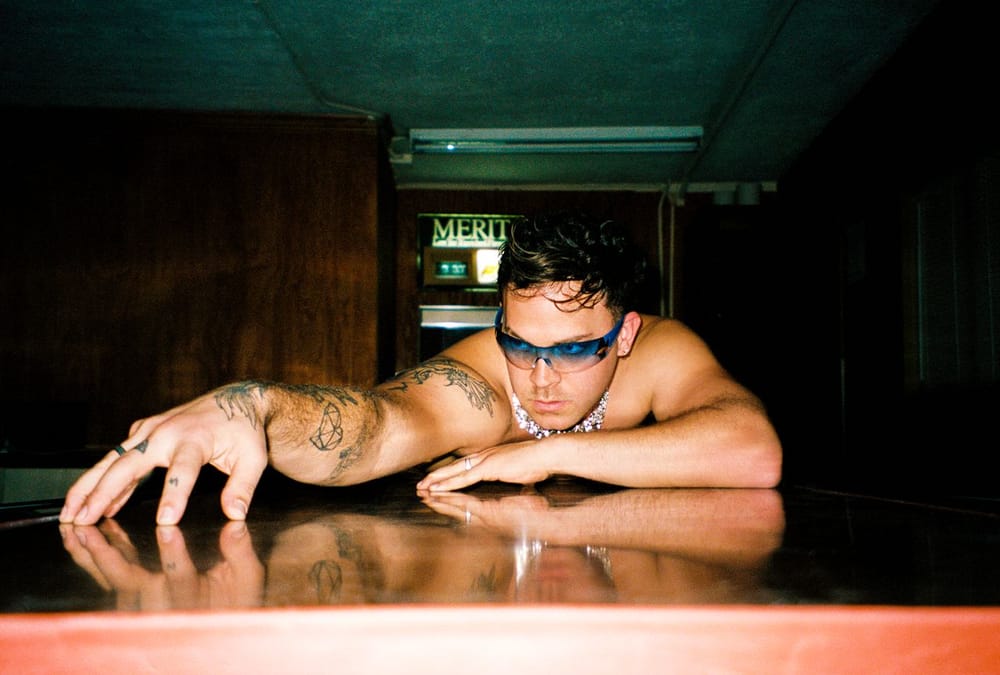The future of emo is here, and leading the charge is Broadwing. With raw, unfiltered energy, the heart of pop-punk, and a deeply DIY ethos at their core, the Portland-based trio are here to revitalize the scene. Broadwing fuses relatable lyrics with elements of emo, trap, hyperpop, and hip-hop to create a sound as nostalgic as it is fresh.
With their latest single, “Famou$,” they have flipped the concept of success on it’s head, reminding us that true fulfillment comes from passion. The music video even involves literally flipping a car. What’s good music without a little chaos?
MSM: Starting out with some fun icebreaker questions — If each of you had to describe Broadwing as a movie genre, what would it be?
DAVE SWILLUM: That's not an icebreaker, Melanie. That's some heavy stuff right there.
ZACH ZYLA: It's like a Two and a Half Men situation.
GAGE GALLANT: Some songs are Michael Bay and other ones are, I dunno, name another director…
DAVE: M Night Shymalan. I think it’s like, I don't want to say action because it's not always corny, but it’s very fast-paced. So I want to say maybe action-comedy or something with a little bit of lip to it, a little bit of edge.
MSM: What's a guilty pleasure artist or song that each of you have right now?
ZACH: I don't feel bad about it, but John Mayer. John Mayer is my guilty one.
GAGE: The dad rock resurgence, all the Creed and Nickelback. I'm here for it. I'm all for it. I know that's probably everybody's opinion because we were making fun of them for a long time, but okay, yeah, it's actually really good and I miss it.
DAVE: Guilty pleasure. I feel like it's hard because I am pretty unabashed about it. I'll listen to a lot of stuff on loop, especially if it's a new thing that sounds fresh or something, even though it's not a genre I usually listen to. So, I've been rolling down 95 blasting Ariana Grande or something like that. But I'm just like a dude with a beard chilling, and if some other person's staring in, I really don't give a shit. I don't care. So it's like a guilty pleasure, I guess, because if someone's seing me, they'd be like, what's up? But I don't know, I like it. I like listening to new stuff, like anything that's new and really cool. I like checking out all sorts of different stuff.
MSM: If you got to have a dream show — I'll let each of you pick a band — who would you want to be on the lineup with Broadwing?
GAGE: I've been really digging The Story So Far recently, with this kind of resurgence of all this stuff. That'd be a solid pick.
ZACH: I'm going to say, there's no resurgence. This is a lifestyle, man. I'm wearing The Story So Far under this sweater right now. And I'm going to throw Bilmuri on that list.
DAVE: Alright, I'm going to throw a weird one in there. I've never gotten to see an OG Misfits show. I think it would be pretty fucking cool to see and to play with the actual Misfits or something like that, and just see that from side stage. That would be almost like a “for me” decision, but also A Day to Remember would just be sick. We would love to open for them. It'd be a kind of cool influence.
MSM: Yeah, definitely. Okay, so diving into the less fun, just a little more serious questions — “Famou$” focuses on fulfillment through passion instead of being in the spotlight. Do you have a specific moment or experience that inspired “Famou$”?
DAVE: So, I was working a job that I was miserable at, to the point where I had a tough time breathing the night before ifI had to go into the office from just the anxiety of how dreadful it was. And I had a beaten up Hyundai that I put a ton of miles on, and I was driving down a dirt road in Maine, and my engine just stopped while I was driving. So I'm just sitting there, coasting into a stop somewhere, running into a bunch of stuff on the side of the road. And it was one of those moments where it's kind of like, can anything else go wrong? It was one of those days where it was just like, dude, I'm in a car that I don't even like, doing a job that I hate, and now I'm just chilling in the middle of the woods where no one can find me, hoping that I find a way out of the situation. So I was just out of the car, kind of just being like, dude, I don't want to be famous, I don't want to be rich, I don't need to be some special thing…I just want to not be miserable doing the job that I'm doing or whatever makes my income. And I just want to do things that are creative with friends and have fun, and just leave it simple like that. But it's kind of like a “come on man, just help a brother out here” moment.
MSM: So, Portland (Maine) isn't necessarily the really the first thing that people might think of for a rising music scene. Would you say anything about being there has kind of shaped your music and approach to it? Or maybe even, what is the music scene like there?
DAVE: Yeah, I think that the music scene here is interesting with us doing pop punk and honestly any alt, and there are still pockets of metal. They do some festivals way north and stuff in the woods that are really cool. There's kind of pockets of that, but this whole scene over here is really small. So I guess the way that it affects us or shapes us is you're going to know all the bands here. You'll know everyone in these bands because there's just not a lot of those genres. So whenever we're playing shows and stuff, they're always pocketed together and you're running into the same people. So it's super tight and there's a lot of the area for a lot of the bigger shows and things like that, they stick around a lot of indie and jam and kind of some things like that. So I feel like it is a good music scene because when you're having shows, people are so all-in and loyal and stoked on it, and there's a lot of camaraderie with how tight the scene is. But it also is what I would say is a rising scene. It's more of a connected piece of New England where there's the kind of people that come up to play Portland, Burlington, Vermont, and Boston. I feel like they're all kind of connected where a lot of times, artists are kind of playing New England, even if they're in New England, so you're kind of playing the other cities in New England.
GAGE: I think another thing about just the Northeast in general, where it just gets cold and shitty, it's just like there's a little bit more salt and grit to the people up here. I feel like people go harder at a show. They're here, they've suffered during the day, and they come to have a good time at night or whatever. Work hard, play hard, and yeah, the weather sucks, everything sucks, so we're just going to have a damn good time at this show.
MSM: Like a “let it all out” kind of thing.
DAVE: Exactly. It gets to a point in the winter where it's dark at like 2:30, so there is a certain part where people are just fueled by sadness. So I would say that as a pop punk, sad boy vibe, there's a certain point in the wintertime that I feel like is like that Stockholm in Sweden, the same type of stuff happens where it's cold, and you have zero sunlight that you've gotten for a month, and I don't know, people just throw down.
MSM: Yeah. So you've kind of gone from acoustic indie roots, and you have a blend of alt rock, hyper pop, and even emo trap. You kind of just have a lot of stuff going on, so how do you hold onto your DIY identity while you're evolving?
ZACH: I think “Famous” is a great example for that because of the video that we pulled together. We flipped a car, and I don't know too many small bands that have done that. And we were trying to do things that are creative and different, and maybe we didn't tell the greatest story, but it fits the vibe that we were doing. The Honda breaking down, we broke the car down, and we performed on it. All of our projects are kind of like that where we kind of approach 'em from a “where do we go from here” kind of perspective.
DAVE: In terms of the indie kind of acoustic scene, going into this vibe where there's a lot more samples and drum beats and synths and things like that are folded in, there's still a ton of acoustic guitar in some of these songs, just kind of hidden in, and there's a lot of it that are literally where we're demoing the songs before we've gone to studio, and we literally end up using the demo acoustic that's recorded on my terrible piece of shit Yamaha guitar in a bedroom. So it's hidden because there's a lot more going on in the songs now, but there still is a lot of that old school guitar sound we were doing before, but I guess more less-polished stuff going on with acoustic and things recorded in a bedroom that make the final cut in our part of it, too.
MSM: Do you have any funny stories from the creation of the video itself? What was that like?
GAGE: I guess it's weird because it was just at my work. I'm lucky enough to work at a place that has some resources and a really good facilities team, and when we were talking about making the video, Dave was like, “Oh, I have these couple ideas where I kind of want to involve a car (with the theme we were talking about earlier), and it would be sick if we could flip it. And we also need an office space for the theme.” And I was just like, “okay, actually, I might have us on this one, guys, let me talk to some people.” And I literally just talked to the facilities guy that runs that section and explained that to 'em. They have a bunch of access to broken down impounded cars and stuff that police will use for training or whatever. And so, I was like, “Hey, can I get one of the beater cars to film a video?” And he was like, “Yeah, sure, that's fine.” And I was like, “Okay, cool. Great. Second question, can it be upside down while I film in it?” And he gave literally the same reaction. And yeah, we used some of the offices that were there to film, too. And so it was just kind of funny how that one just came together. We thought it was going to be a huge logistical hurdle. We're like, where are we going to get a car that we can flip, and where is an office we can get in, where people won't mess with us and kick us out, and be like, what the hell are you guys doing? Or pay big money to rent stuff or whatever.
DAVE: Another story was actually about Gage mostly, but we shot all of it, the office scenes and then going into the car stuff, in a row so that way we could be clean for the office stuff and then dirtier to make it look like it was a wreck to make it so that we got dirty quick enough to look like we were in a car wreck. We literally had our videographer, Ian Erkart, drag Gage by his hands through the mud, walking with him, and dragging him. So we got dragged and were out rolling in the mud and stuff, and there were random people that were driving by. And surprisingly, even when I was ratcheted upside down in the car and we had fake wounds and we were rolling in the mud and stuff, people were driving right by and they would look over and then there's a look, like yeah, that checks out. Yep, just drive right by. Maybe it was like you're just seeing something weird and are like, I'm going to ignore this and pretend this is not happening, do not put me as a part of this or something.
GAGE: Yeah, I feel like maybe they saw the camera on the drum set and the random gear, and they're like, “oh, they're filming a movie or something.”
MSM: You have been described as “organized chaos.” How intentional would you say that balance is between chaos and accessibility?
DAVE: Through the music piece of it or through any specific part of it?
MSM: I would say the music, or maybe how intentional is the chaos aspect?
GAGE: Usually unintentional.
DAVE: Yeah. I think it's — unfortunately, for our lives and our stress levels — usually extremely authentic. We've started to get smarter and plan things out, and then basically we'll be two or three months ahead of time and somehow something still goes wrong and we end up right in that shit in a bad way again. But on stage, I would say that, I don't know, I feel like when we're playing or something, we're always jumping around and standing on shit and hurting ourselves by accident and all that is just what's really happening. And sometimes it was not a good decision and it is definitely real chaos. So I don't know. I feel like it's a different part for that.
MSM: Looking back at your other EPs, Nomad and Tennessee, what do you feel is most different about who you are as a band now versus then?
DAVE: A ton.
GAGE: There's a lot there. There's a lot to unpack there.
DAVE: Nomad was the first stuff that we ever wrote. I wrote that starting out with Ethan Hunter, who was in another band at that time after our bands dissolved. And then Tennessee was when Ethan moved to Nashville, and I was kind of by myself with Ryan and Scott and we reformed, and that's why that sound shifted again. And a lot of that was starting to be released during COVID, and my life started getting extra shitty during COVID. Then I moved up to Maine from New Hampshire during that time, and Gage dealt with a ton of stuff down in Florida and kind of moved back to New England. And we used to play in a band forever ago, like 10-12 years ago, so we kind of reformed together. And then Zach was a good friend of ours that started subbing in for shows because we were getting our ass kicked as a two piece. We were going to try to do it and it was not working well, and he came in and kind of saved us there.
But I think from those two first records, it was like we used to play in a bunch of hardcore bands and metal bands that I didn't sing in, or at least not anywhere near the amount that I do with this. So those first two EPs were really trying to figure this out after screaming forever and yelling and all sorts of stuff like that, what am I supposed to do and how am I supposed to sound and what is this supposed to be? I feel like those EPs were whatever that moment in time was, and I liked those EPs, but I think right now some of the singles and this album we're doing next year are really the sound of this band now. And I feel like the chemistry between us and everything is the best that we've had for the project. Do you guys have anything?
ZACH: I'm just happy to be here.
MSM: So, along those lines with things that have changed, what has stayed the same about Broadwing from day one to now? Is there anything that’s been like the heart and soul of the band?
GAGE: Absolute sarcasm all the time. And shenanigans, I'll add. Yeah, just ridiculous shenanigans. Regardless of whatever situation we're in, when we're usually dealing with those curve balls, we still are laughing about stuff instead.
DAVE: I guess with staying the same, a lot of the writing for the songs, at least in terms of the lyrics, are what I've had control of the most the whole time, I guess between all the changes. It's always stuff that really happened to me in my life in some way, shape, or form. And it's sometimes extremely literal of hey, this is a thing that happened and do you feel the same or have you experienced this? So, I think that one consistency is we're always trying to bring something that isn't just a random story that we come up with, or something that's not connected to a thing. It's a lot of the things are something that I've experienced and then hopefully, obviously, some of the feedback is people coming up and saying like, dude, I just dealt with this last week and I dealt with this three months ago or whatever, and I fucking felt that what you said about this. So I feel like maybe authenticity or a real thing happening hopefully is whats delivered. I don't know if it comes through.
MSM: So, authenticity and having fun, no matter what.
GAGE: Yeah, I think fun chaos. Another one for me, especially as the drummer, is energy, because that's what's always kind driving me for performing is just, it's fun when you play higher energy music. So whether it's the hardcore metal scene back in the day or doing this high energy pop on stuff, it's got to have the energy for me, I should be dying at the end of the set, and that's the genre I should be in. There's a lot that applies there, but as long as I'm very tired by the end of playing the set, and miserable, that's the goal.
MSM: So, you've just finished the debut album. Is there anything that you can give away about it? Is there a bigger picture besides “Famou$”? Is there a story you're trying to tell that you can share at this point?
DAVE: All the songs were written about stuff that's happened for the past five years, and that was a ton of coming to age from your twenties into your early thirties, and all that really sinking in and just feeling like, "oh shit, this is actually life." I feel like there's a lot in late twenties, especially COVID hit when I turned 30, there was a ton that happened where it was like, maybe this isn't going to be this way forever. And then there was a ton that was like, shit, I feel like this just keeps happening unless I change shit and this sucks, bad. So there's a lot of stories throughout the whole record that are kind of like, this is what life is, these are the things that can really happen, good or bad. And there's a lot, systematically and throughout the world, that are cycles of things happening that we come to different realizations at different ages to be like, oh shit, this is a thing that has always happened and now I'm at this spot in my life or something. There's kind of some bigger picture stuff like that that you'll see through the themes I feel like.
GAGE: We have one more coming up and then we have the final single, we're going to release January,
MSM: And then, the last question is kind of a tough one. If you could sum up the story that Broadway is basically trying to tell overall, what would you say with one sentence? So, if people were listening to Broadwing, what is something you want to be the takeaway?
DAVE: Life is crazy — both good and bad stuff's going to happen, so you might as well laugh and be sarcastic and have fun with it, especially at shows with friends and the shit that brought us together, regardless of any of it. And that brings us together in that sentiment.
